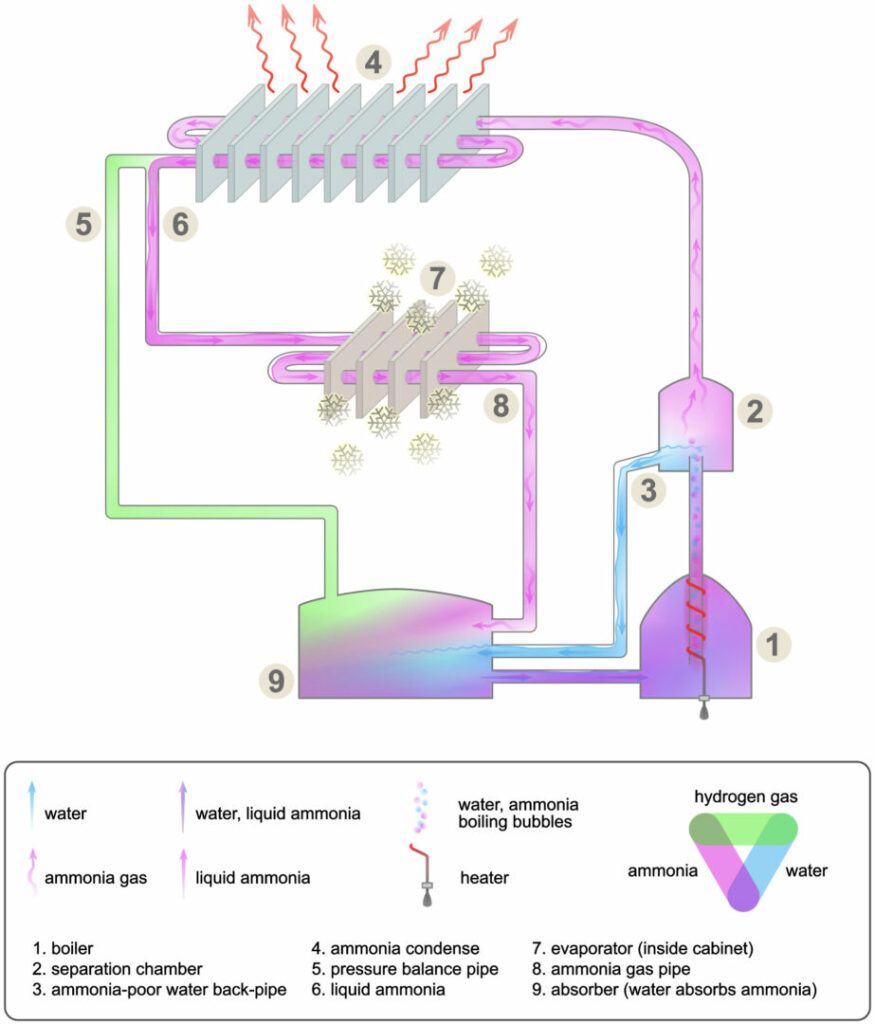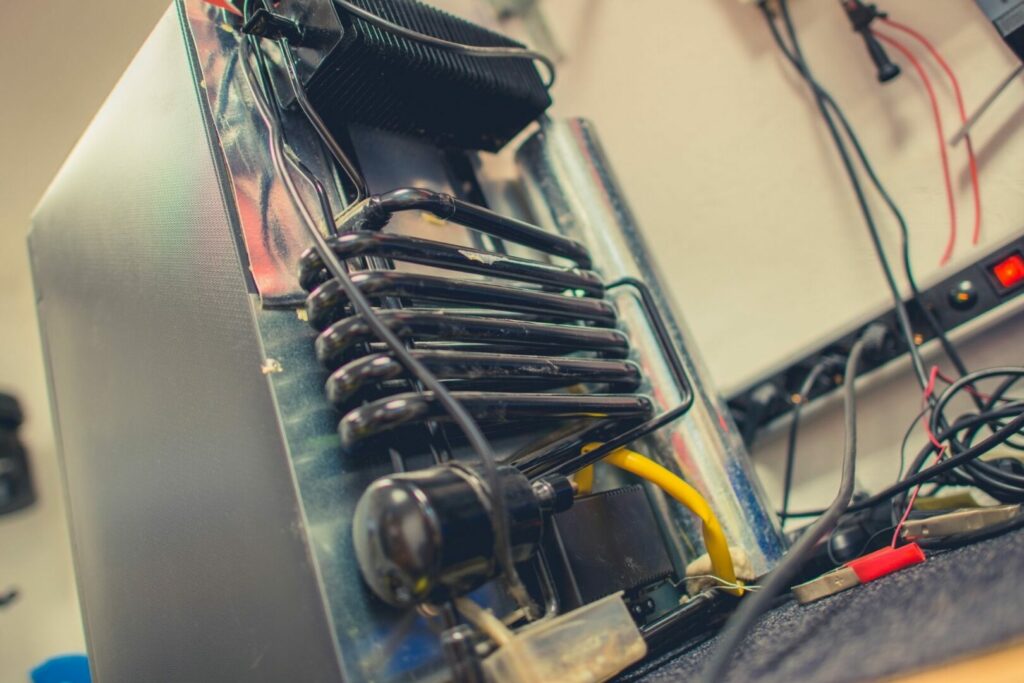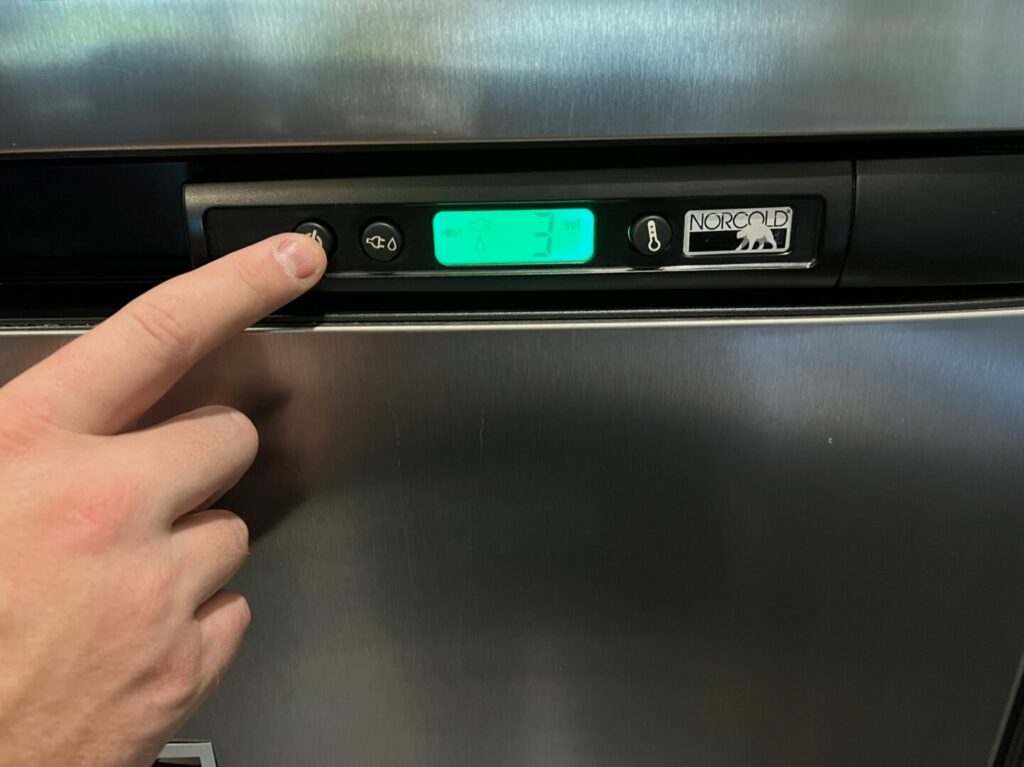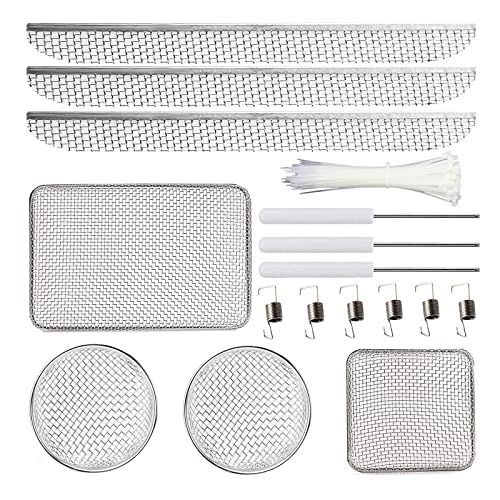Table of Contents Show
Maybe you’re new to RVing, and you don’t how your RV propane fridge works compared to your residential fridge in your kitchen. It’s important to know the differences to care for and maintain your refrigerator properly. Let’s look at how your RV propane fridge operates and then identify a few tips to help with efficiency.
What Is an RV Propane Fridge?
An RV fridge uses propane as an energy source. Two-way and three-way options run off of propane, 120V AC power, or 12V DC power.
RV propane fridges use an absorption process to extract the heat inside instead of using compressor technology that you find in electric ones.
How Does an RV Fridge Works on Propane

A solution of hydrogen, ammonia, and water cools your fridge. First, the cooling process begins with heat from a propane flame. This flame begins to heat the ammonia and water solution until the ammonia reaches its boiling point.
Then, through evaporation, it separates from the water. The ammonia gas goes into the condenser, where it cools and returns to a liquid state. The water goes into the absorber. The ammonia combines with hydrogen gas in the condenser to form a gas again.
This is where absorption happens. When the ammonia and hydrogen gas mixture evaporates, it sucks the hot air out of the fridge.
The gas returns to the absorber with the water. Then the ammonia turns back into a liquid. The hydrogen gas returns to the evaporator, and the process begins again.
How Long Will an RV Fridge Run on Propane?
This varies by size and efficiency. A 10 to 12 cubic ft RV propane fridge will consume about 1.5 lbs of propane per day. Older models will use more because they have less thermal efficiency.
A cooling fan placed inside the fridge will help circulate the cooler air, thus using less propane. Keeping your rig level at all times will also help with efficiency.
If you have a 20lb propane tank, you can run your RV propane fridge for about two weeks, depending on how much propane you use for other things like cooking and heating.
The Pros of RV Propane Fridges
The durability of RV propane fridges makes them a popular choice. Residential fridges don’t work well for RV travel.
Smaller electric fridges run off a compressor and have moving parts that get jostled around. An RV propane fridge doesn’t have any moving parts because of the absorption process, which means you have fewer things that break.
If you don’t have solar power, propane will work the best for off-grid camping. RV propane fridges don’t need electricity to operate, so your fridge can still function no matter where you camp.
Considering RV propane fridges can run for days or weeks on that fuel, you also don’t have to worry about refilling your tanks.

The Cons of RV Propane Fridges
You must keep an RV propane fridge level for it to work correctly. Gravity pulls down the ammonia liquid, so setting up on uneven ground will make the fridge less efficient. Additionally, the ammonia can damage the evaporator coils if it doesn’t get properly distributed.
Pro Tip: Keep your RV refrigerator running well by learning the art of leveling your RV.
Compared to newer electric fridges, RV propane fridges are less energy efficient. A small 6 cubic ft propane fridge will use around 440W, whereas a larger 10 cubic ft electric fridge will use less than half of that energy.
The absorption process takes longer to cool a fridge. It can take up to 24 hours or more for your fridge to be food-safe. Electric fridges cool down much faster with compressor technology.
You also have a higher risk of dangerous leaks because of the ammonia and hydrogen. Sometimes a leak means replacing an entire cooling unit. Other times it means getting a whole new fridge. Breathing in the gas can cause dangerous health concerns.
Finally, another big concern of an RV propane fridge is the higher risk of fire. You shouldn’t drive with the propane on. However, many travelers do this to keep their food from spoiling.
The tiniest spark can ignite an explosion. If you blow a tire or get into an accident, debris can cut one of the gas lines and possibly lead to a fire.
Tips for Your RV Propane Fridge
Since RV propane fridges don’t use energy as efficiently, here are some tips to help keep your food cold. They don’t operate like your residential fridge in your kitchen, so you’ll have to put in extra effort to maintain the quality and lifespan of your fridge.
Install a Small Fan for Better Airflow
As mentioned above, a small cooling fan placed inside the fridge will help keep the cool air circulating. Heat can get trapped in dead space. A fan will keep the heat out by moving the cold air to help with the absorption process.
Pro Tip: We’ve researched the best RV refrigerator fans to keep your food cold in your propane fridge.
Defrost Regularly
Every time you open the fridge, you let in air. The water vapor in the air forms droplets on the evaporator. Unlike your residential fridge, an RV propane fridge doesn’t automatically defrost. You have to do it manually.
When the absorber fins in the back of the fridge ice over, you’ll want to defrost it. At night, turn the fridge thermostat dial to a minimum setting and leave overnight. By morning, it should have defrosted.
Keep Your RV Level
This tip is essential to maintaining the quality of your RV propane fridge. If you don’t remain level, the absorption process won’t work well, which means the refrigerator won’t cool.
The ammonia liquid has to fall from the condenser to the evaporator during this process. Ammonia crystallizing on the evaporator coils can shorten the life of your fridge.
Ensure Vents Aren’t Blocked
Ensure your RV propane fridge doesn’t have blocked vents, which is important to the cooling process and your health.
First, the heat dissipates more quickly in clear vents, especially on hot days. Second, vents allow fresh air in.
Carbon monoxide from the burning propane also gets safely released outside. If the vent gets blocked, you can risk this dangerous gas filling your RV.
Safety Check: Are you smelling propane in or around your RV? It might be time to change or upgrade your RV propane regulator. Here are the best!
Keep Bugs Out
Part of keeping your vents clean includes keeping bugs out. Install a screen like the one below on your vent cover. It won’t block the airflow, but it will keep pests from getting trapped inside.
- ◆.Package includes:Three 20" x 1-1/2" RV Furnaces Bug Screens;Two 2.8''x1.3'' Circular Flying Insect Screens;One...
- ◆.High Quality : Mesh screen is made of Heavy-duty stainless steel ,Minimal airflow restriction for RVs furnace vent...
These screens will also reduce the chance of wasps or other insects building a nest inside the vent. Even rodents can find their way inside.
Can You Leave Your Fridge on While Driving?
As mentioned above, some RVers will leave their RV propane fridge on while driving to ensure their food doesn’t spoil. Although this is convenient, it’s not safe. Though the chances of having a tire blow out or getting into an accident are slim, keeping the propane on can cause a fire if an accident sparks a flame.
If you drive carefully, check your tire pressure, and perform routine maintenance, you can help prevent such things from happening. But the risk is still there.
Additionally, some states require you to turn off your propane when going through tunnels. And, you always have to turn off propane when entering a fuel station.
Instead of leaving your propane turned on, use other techniques like turning down the temperature the night before a travel day and tightly packing your cold items to keep them cool during travel.

Your RV Fridge Doesn’t Have to Be Complicated
Having an RV propane fridge adds convenience to your travels. You don’t have to hook up to power. You don’t have to worry so much about durability and moving parts breaking. It’s not a complicated appliance, but these tips will help ensure it runs as efficiently as possible.
You don’t want to arrive at your campsite on Friday night to find all of your food has spoiled. Take care of your RV propane fridge by understanding how it operates and how you can aid in that process.
When was the last time you defrosted your propane fridge?
Last update on 2025-01-19 / Affiliate links / Images from Amazon Product Advertising API







